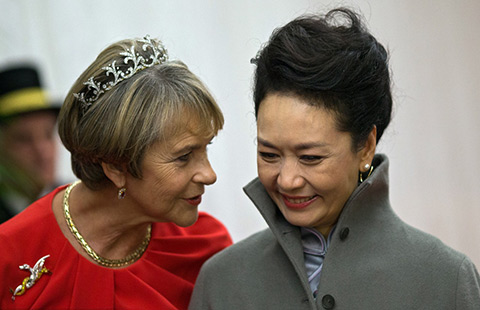

 |
|
A girl reads a book in Tianjin Library, Sept 30, 2012. [Photo/Xinhua] |
The General Secretary of the Communist Party of China Hu Jintao's address to the 18th CPC National Congress on Nov 8 stressed the importance of improving people's livelihood. He set a goal to build a xiaokang (moderately well-off) society by 2020, when the country's GDP and people's income would be double that of 2010.
The fundamental question is whether a richer nation will also be a happier nation?
The answer is: "Maybe".
It is, therefore, good that some local governments recently introduced a "happiness index" to evaluate government performance. The term "gross national happiness" (GNH) was coined by Bhutan's fourth "Dragon King" 40 years ago. GNH measures the quality of life or social progress in a more holistic and psychological way than the economic indicator, GDP.
The difficulty with producing a happiness ranking for a country is that, unlike GDP which can be objectively measured, GNH is largely subjective, dependent on the vagaries of individuals at given moments in time.
Recently, China Central Television telecast a series of surveys on China's GNH, which sparked a heated debate because most interviewees said they were happy and presented a picture in sharp contrast to online complaints.
Unquestionably, Chinese people report greater economic satisfaction with their lives. According to a Pew face-to-face study covering 3,177 people between March 18 and April 15, 70 percent of the respondents said they were better off financially now than they were five years ago. A remarkable 92 percent of Chinese said their standard of living was better than their parents' at a similar age.
A 2010 Reuters-Ipsos poll of people in 23 countries and regions found that more than two-thirds of Chinese surveyed believed that "money is the best sign of a person's success".
Along with South Korea, the percentage of people in China equating success with money was higher than any of the other countries, and more than twice as high as in the US.
 2nd China-CEEC Investment and Trade Expo held in Ningbo
2nd China-CEEC Investment and Trade Expo held in Ningbo
 Shanghai Disneyland all set for official opening on Thursday
Shanghai Disneyland all set for official opening on Thursday
 Tea sector, economic pillar of SW China's Fenggan
Tea sector, economic pillar of SW China's Fenggan
 High-end lifestyle goes mobile
High-end lifestyle goes mobile
 Nine Chinese on world's most powerful women list
Nine Chinese on world's most powerful women list
 Elderly man carries on 1,000-year old dragon boat craft
Elderly man carries on 1,000-year old dragon boat craft
 Top 10 destinations for luxury retailers in the world
Top 10 destinations for luxury retailers in the world
 Nutritious meals grow in popularity in Chinese cities
Nutritious meals grow in popularity in Chinese cities